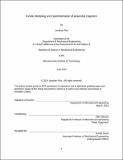Kinetic modeling and experimentation of anaerobic digestion
Author(s)
Rea, Jonathan (Jonathan E.)
DownloadFull printable version (1.541Mb)
Other Contributors
Massachusetts Institute of Technology. Department of Mechanical Engineering.
Advisor
Alex Slocum.
Terms of use
Metadata
Show full item recordAbstract
Anaerobic digesters convert organic waste (agricultural and food waste, animal or human manure, and other organic waste), into energy (in the form of biogas or electricity). An added benefit to bio-digestion is a leftover high-grade organic fertilizer. Models of the anaerobic digestion process do exist, but either rely on simple algebraic equations instead of biochemical reactions, or consider so many external parameters that they become overly complicated and require much input information and computation time. This work provides an intermediate kinetic model that predicts biogas output over time with few inputs. This kinetic model is justified by a small-scale laboratory experiment, and parameters are adjusted to match experimental results. This model can be used to optimize design parameters for an anaerobic digester, and provides information such as the relationship between digester sizing and feed rate. The process used here may be expanded to other feedstock materials and repeated for other similar applications, in an effort to expand anaerobic digestion systems as a clean energy source.
Description
Thesis: S.B., Massachusetts Institute of Technology, Department of Mechanical Engineering, 2014. This electronic version was submitted by the student author. The certified thesis is available in the Institute Archives and Special Collections. Cataloged from student-submitted PDF version of thesis. Includes bibliographical references (pages 57-58).
Date issued
2014Department
Massachusetts Institute of Technology. Department of Mechanical EngineeringPublisher
Massachusetts Institute of Technology
Keywords
Mechanical Engineering.